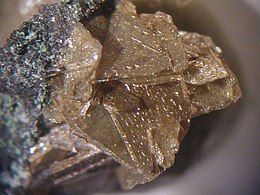Abhurite
| Abhurite | |
|---|---|
 Brownish tabular crystals of abhurite from Shipwreck "Hydra", South coast of Norway | |
| General | |
| Category | Halide mineral |
| Formula (repeating unit) | Sn21O6(OH)14Cl16 |
| IMA symbol | Abh[1] |
| Strunz classification | 3.DA.30 |
| Crystal system | Trigonal |
| Crystal class | Trapezohedral (32) H-M symbol: (32) |
| Space group | R3 2 |
| Unit cell | a = 10.0175 Å, c = 44.014 Å; Z=3 |
| Identification | |
| Color | Colorless/Pale yellow-greenish |
| Crystal habit | Platy, thin crystals, cryptocrystalline crusts |
| Twinning | On 0001 |
| Cleavage | None |
| Fracture | Hackly |
| Tenacity | Fragile |
| Mohs scale hardness | 2 |
| Streak | White |
| Diaphaneity | Transparent |
| Specific gravity | 4.42 |
| Density | 4.42 g/cm3 (Measured) 4.417 g/cm3 (Calculated) |
| Optical properties | Uniaxial (+) |
| Refractive index | nω = 2.060 nε = 2.110 |
| Birefringence | δ = 0.050 |
| Other characteristics | opalescent |
| References | [2][3][4] |
Abhurite is a mineral of tin, oxygen, hydrogen, and chlorine with the formula Sn21O6(OH)14Cl16[4][2] or Sn3O(OH)2Cl2.[5] It is named after its type locality, a shipwreck with tin ingots at Sharm Abhur, a cove near Jeddah in the Red Sea. Abhurite forms alongside other tin minerals like romarchite and cassiterite.[6] Abhurite can vary in color, from pale green/yellow to darker brown/green[7]
Locality and formation
[edit]Abhurite is attributed for forming on tin materials when in contact with sea water. The mineral was described in 1977 from a shipwreck near Hidra Island, Norway, where it occurred on pewter plates. However, that report was not recognized by the International Mineralogical Association.[2] Along with Sharm Abhur and the shipwreck near Hidra Island, abhurite was found on tin ingots in the Uluburun shipwreck. On the ingots, it was found with other tin minerals like cassiterite and romarchite, and calcium carbonate minerals like calcite and aragonite.[8]
See also
[edit]References
[edit]- ^ Warr, L.N. (2021). "IMA–CNMNC approved mineral symbols". Mineralogical Magazine. 85 (3): 291–320. Bibcode:2021MinM...85..291W. doi:10.1180/mgm.2021.43. S2CID 235729616.
- ^ a b c Mindat.org – Abhurite
- ^ Webmineral.org – Abhurite
- ^ a b "Handbook of Mineralogy – Abhurite" (PDF). Archived from the original (PDF) on 2015-09-24. Retrieved 2013-01-26.
- ^ Richard V. Gaines, H. Catherine W. Skinner, Eugene E. Foord, Brian Mason, and Abraham Rosenzweig: "Dana's new mineralogy", p. 401. John Wiley & Sons, 1997
- ^ Memet, J. B. (2007). "The corrosion of metallic artefacts in seawater: descriptive analysis". In Dillmann, P.; Beranger, G.; Piccardo, P.; Matthiessen, H. (eds.). Corrosion of Metallic Heritage Artefacts: Investigation, Conservation and Prediction of Long Term Behaviour. Elsevier. pp. 152–169. doi:10.1533/9781845693015.152. ISBN 9781845693015.
- ^ https://www.mindat.org/photoscroll.php?frm_id=pscroll&cform_is_valid=1&searchbox=Abhurite&submit_pscroll=Search
- ^ Vandiver, Pamela B.; Goodway, Martha; Mass, Jennifer L. (2002-01-01). Materials Issues in Art and Archaeology VI: Symposium Held November 26–30, 2001, Boston, Massachusetts, U.S.A. Materials Research Society. ISBN 9781558996489.
